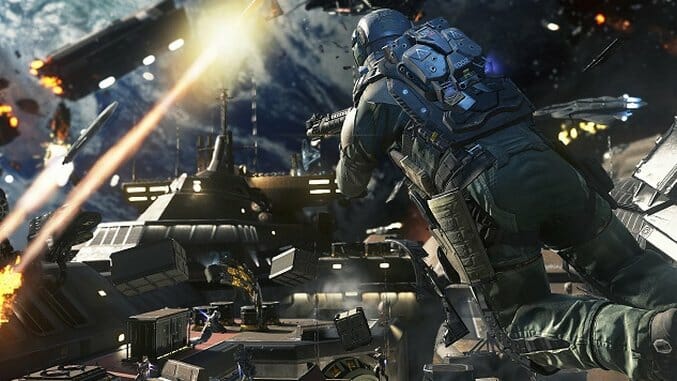Call of Duty: Infinite Warfare is an Unambivalent Celebration of War

Infinite Warfare puts you in the shoes of a man trying to save Earth. Unlike some other games in the Call of Duty franchise, you remain locked in those shoes throughout the entire game: Your name is Nick Reyes, you’re a crack pilot, and you’re also the planet Earth’s last hope. You’re not reading this wrong if that sounds like it might be something outside of the normal realm of the long-storied franchise off the Call of Duty games. We’ve fought in the second World War, Vietnam, Cold War skirmishes across the world, and in near-future conflicts located all over the planet. Infinite Warfare doesn’t just place us in a slightly-better-tech future cribbed from war fan fiction and the wet dreams of the defense industry—it puts us in a world where humans have mastered lightspeed travel and colonized the entirety of our solar system.
That expansion came with some friction. Earth was dying, so we built a colony on Mars to weather the storm. Earth got better, I guess, and the Martian government became more totalitarian. A war of secession a couple decades back split the two planets into two competing, spacefaring civilizations, and Infinite Warfare opens with the military invasion of Earth by those Martian separatists.
Look, let’s get some stuff out of the way here because it’s technically important: if you’re looking for a game to shoot people in, you can do that here. It is neither more inspired nor more interesting than any other entry in these games since Call of Duty: Ghosts. The weighty, “realistic” shooting of the franchise up to Ghosts has totally been abandoned, and it feels like I’m scooting around these levels as a floaty phantom with a Nerf gun. Call of Duty games are fundamentally different than what they used to be, and whether you like that is totally up to you. As for myself, I really yearn for those old, weighty, clunky guns.
There are also a number of gadgets that are all brilliantly designed and genuinely interesting the first couple of times you use them. There are little robotic spiders that hunt down enemies in cover, and there are grenades that turn off gravity in a select area. Sometimes you’re in space, and you can grab people with a grappling hook to murder in a slightly more interesting way. You can hack some robots. You can sometimes do air strikes. Every single one of these actions are well-made, well-designed, and utterly boring after the tenth time you do them.
In addition, I’ll be honest and say that I was blindsided by the fact that a full 30% of Infinite Warfare is a spaceship dogfighting game. Reyes is a crack ace fighter pilot pew pew pew man who is very strong and can do many airfights very good, and we get to experience that in a number of different missions that have us warping into an area, zipping around to shoot other pilots down, and getting the heck and hell out of there. The first couple of these missions are excellent, but the fifth, sixth, and forward ones were full of diminishing returns of fun.
If you can’t tell, I am deeply conflicted about this game. Infinite Warfare is a tightly-written game that is well-designed, superbly art-directed, and keeps the pace up from moment to moment in a way that few games in the franchise have managed to do. From the perspective of gameplay and my engagement with the game loop, I think the dev team did a damn fine job. But when I’m not in that loop, I’m amazingly distant from the game. I don’t think about big explosive moments that I loved. I don’t say “whoa, Internet Friends, let me tell you about this gameplay experience.” I just kind of blank on it.
From a narrative perspective, I can say that I’ve found Infinite Warfare to be one of the best-told Call of Duty games while also being one of the most troubling ones. Many of the previous installments jumped around the world to tell a story from the perspective of many different people who were all doing things at different times. The Modern Warfare trilogy, the real breakout stars of the entire franchise, took an almost novelistic approach to showing you all the different actors that made conflict and war possible. Some were victims, some were vicious murderers, and others were blockbuster heroes shooting their way through dozens of enemies. This approach was a way of playing with pacing and how the player came to understand the world that the game took place in: modern warfare was always bigger than a single hero and a single villain.
